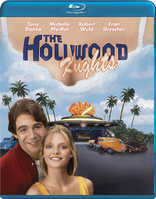The Hollywood Knights Blu-ray Movie
HomeThe Hollywood Knights Blu-ray Movie 
Image Entertainment | 1980 | 91 min | Rated R | Oct 18, 2011Movie rating
6.8 | / 10 |
Blu-ray rating
| Users | 3.5 | |
| Reviewer | 3.5 | |
| Overall | 3.5 |
Overview
The Hollywood Knights (1980)
Led by their comedic and pranking leader, Newbomb Turk, the Hollywood Knights car gang raise hell throughout Beverly Hills on Halloween Night, 1965. Everything from drag racing to Vietnam to high school love.
Starring: Tony Danza, Michelle Pfeiffer, Robert Wuhl, Fran Drescher, Mike BinderDirector: Floyd Mutrux
| Coming of age | Uncertain |
| Teen | Uncertain |
| Comedy | Uncertain |
Specifications
Video
Video codec: MPEG-4 AVC
Video resolution: 1080p
Aspect ratio: 1.85:1
Original aspect ratio: 1.85:1
Audio
English: DTS-HD Master Audio 5.1 (48kHz, 24-bit)
BDInfo
Subtitles
English SDH, Spanish
Discs
25GB Blu-ray Disc
Single disc (1 BD)
Playback
Region A (B, C untested)
Review
Rating summary
| Movie | 3.0 | |
| Video | 3.5 | |
| Audio | 3.0 | |
| Extras | 0.5 | |
| Overall | 3.5 |
The Hollywood Knights Blu-ray Movie Review
Before Porky's and After Graffiti
Reviewed by Michael Reuben October 31, 2011The cover art for The Hollywood Knights features Michelle Pfeiffer and Tony Danza, but don't be misled. It was the first feature film for both actors, they have minimal screen time, and their trite romantic subplot is the least characteristic element of the film. It feels almost like the "redeeming social value" that pornographers used to have to shoehorn into their product to survive legal challenges. When the film debuted in 1980, the one-sheet didn't feature any single character. It was a wildly frenetic line drawing full of comings and goings, which accurately reflects the unstructured sketch style of the film. If anyone should be featured in the film's art, it would be Robert Wuhl, who would later become better known as the reporter Alexander Knox in Tim Burton's Batman and as the cheerfully amoral sports agent Arliss Michaels on seven seasons of HBO's Arli$$. Wuhl's Newbomb Turk (the name itself is inspired) is the animating spirit of Knights, or maybe one should say its whirlwind of destruction. Take any scene that's memorable about Knights, and Newbomb's the one making it happen. Knights preceded Porky's by two years, and yet it was Porky's that became the signature raunch teen comedy of the Eighties, and a much bigger box office hit. Why? Knights had the same anarchic spirit, at least as much bare female flesh and, in the person of Officer Bimbeau (Gailard Sartain), a villain you loved to hate as much as the eponymous owner of Porky's saloon. Let's come back to that question at the end.
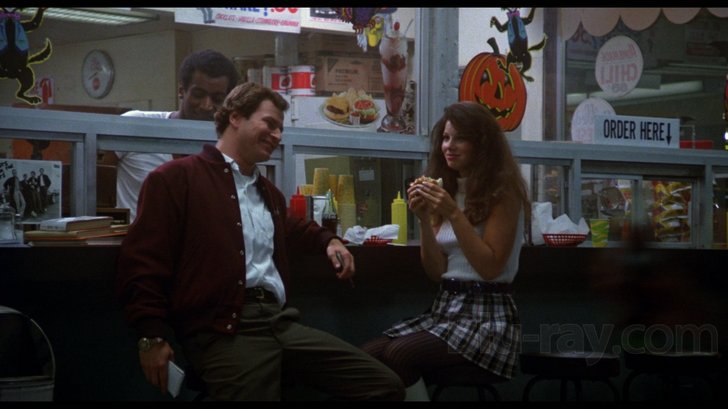
Knights is very consciously a take-off on American Graffiti. Set in the then-recent past, it's based firmly in California car culture and features a loosely connected cast of characters who congregate around a drive-in named Tubby's ("Home of the Big One"). As in Graffiti, the group includes a couple struggling with uncertainty as different futures beckon (Susie Q and Duke, played by Pfeiffer and Danza) and a recent high school graduate about to depart for Vietnam (Jimmy Shine, played by Gary Graham). But where Graffiti evoked nostalgia, Knights trades in rebellion -- and not the socially potent kind that would erupt in the latter half of the Sixties, but the noxious and only locally damaging kind that makes for good, messy R-rated comedy. It's Halloween 1965, and the last night for Tubby's Drive-In, which, improbably enough, is located in posh Beverly Hills. A concerted effort by local home and business owners has resulted in having the area rezoned so that Tubby's can be demolished to make way for attractive new office suites. Of course, the real objection to the place is not the fact that it serves food. It's the crowd that hangs out there: the Hollywood Knights, a long-established and much-envied club of the "bad" kids at the local high school. Pay attention during the film, and it becomes clear that the Knights have been around for years, but somehow lately their hijinks have just become too much for the local citizenry to bear. It quickly becomes apparent that, as in so many things, what was needed was leadership to focus the discontent, in this case the stalwart oversight of Jacqueline Freedman (Leigh French) and her husband Jack (Garry Goodrow), along with one Nevans (Richard Schaal), all of them fine, upstanding representatives of moral rectitude. The fact that Nevans and Mrs. Freedman are passionately committing adultery and sneaking off at every opportunity to screw their brains out is strictly beside the point. Enraged and emboldened by the impending loss of their long-time hangout, the Knights spend Halloween getting even with the forces of decency in their own very special way. Before the evening is out, Newbomb Turk will have entrapped Nevans and Mrs. Freedman with that old standby, the flaming bag of dog crap on the porch; rephrased the banner at the high school pep rally with bold obscenities and Hollywood Knights insignia; infiltrated the school talent contest -- twice! -- by impersonating asthmatic nerd Dudley Laywicker (Stuart Pankin), each time causing outrage with rude excretions or displays of body parts; and hijacked the punch for the school dance so that it can be spiked with a revolting substance whose taste Mrs. Freedman is sure she's had in her mouth before. All of this is in addition to Turk's usual agenda, which includes multiple moonings, hiding in ladies rooms taping catty gossip, so that he can play it back over school loudspeakers and sneaking up on spots where women are likely to be changing clothers or sunbathing topless, Polaroid camera at the ready. One of Turk's most frequent victims is Sally (Fran Drescher), who finds Turk repellent until she makes the mistake of going out with a college boy, Dark (Ken Hixon), who bores her silly. When she finally gives Turk his shot, he blows it, literally. (Seriously, your life isn't complete unless you've heard, "Turk, did you come?" in Drescher's unmistakable Brooklyn whine.) Knights doesn't so much conclude as come to an end. There's no last minute salvation for Tubby's; the movie was about saying good-bye as loudly as possible. Jimmy Shine bids everyone an emotional farewell, and Susie Q and Duke agree to keep listening to each other, while she goes off for a screen test (which should go well, since she looks like Michelle Pfeiffer). What suspense the film has comes courtesy of a group of four pledges (Joey Kamen, Daniel Davies, Duane LaDage and future film director Mike Binder (Reign Over Me)), who are dropped off in Watts, stripped of their clothes, and told to make their way back to Tubby's by closing time. The additional catch is that they have to get a DJ -- Dr. J of KBLA -- to play a special dedication to the Hollywood Knights, and Dr. J only takes such requests in person. Will the hapless pledges make it? Will they even live? Oh please. This isn't just Beverly Hills; it's Hollywood. Twenty-five years from now (in movie time) and fifteen years from now (in real time), a hooker and a billionaire will become the world's favorite couple, and no one will bat an eye.
The Hollywood Knights Blu-ray Movie, Video Quality 
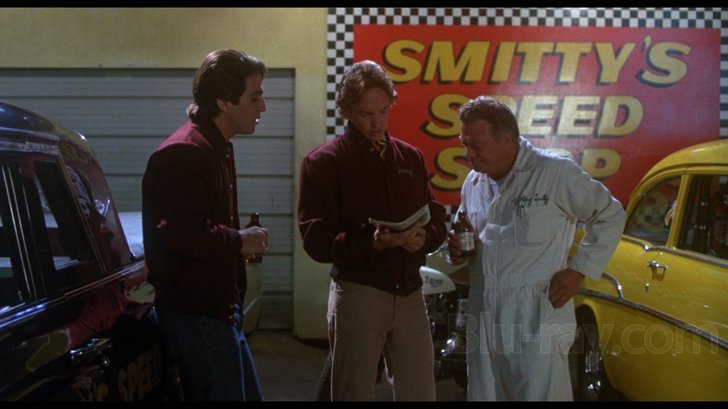
Hollywood Knights was a low-budget production and looks it, but it was shot by a first-class cinematographer, William A. Fraker, whose previous credits included Bullitt and Rosemary's Baby and whose best-known subsequent film is probably Tombstone. (Fraker passed away in May 2010 at age 86.) With much of the action taking place outdoors at night, light levels have to remain low, because the exterior lighting of 1965 (or, for that matter, 1980) didn't generate the kind of output one associates with today's efficient fixtures. Judged by the standard of films made today, the 1080p, AVC-encoded Blu-ray from Image has a grainy image, but judged by the standard of low-budget films of the era, the image is surprisingly good. The grain is well-controlled and never intrudes on the viewing experience. More importantly, it does not appear to have been artificially manipulated or stripped away. Fine detail remains intact, and the grain patterns are natural rather than frozen, clumped together or hanging. Colors are variable, depending on both the production design and the light levels. The colors at the Freedman home gathering, for example, are generally dull and tame, whereas the colors at Tubby's or the high school are more youthful and exuberant. When the occasion calls for it -- for example, when the gang presents Jimmy Shine with a going-away present in the form of some special enhancements to his Ford including an eight-track tape player (yes, an eight-track), the car's vivid yellow paint job shines out. (They call it "Tony Nancy yellow" in honor of a car culture figure who appears briefly in the film.) Dudley's red band uniform is equally bright, the better to distract everyone when Newbomb steals it to disguise himself. There are few true blacks in the film, but this does not appear to be a case of poor black levels so much as a choice by Fraker to overlight and/or overexpose to ensure that everything could be seen. The dark areas of the night do not look "crushed", but rather too bright, as if white levels were slightly higher than normal. In interior scenes, however, white and black levels appear properly balanced, which suggests that the exterior effect reflects the original photography. As noted previously, high frequency filtering does not appear to have been applied, nor did I see any transfer-induced ringing or compression artifacts. The source material is in excellent condition.
The Hollywood Knights Blu-ray Movie, Audio Quality 
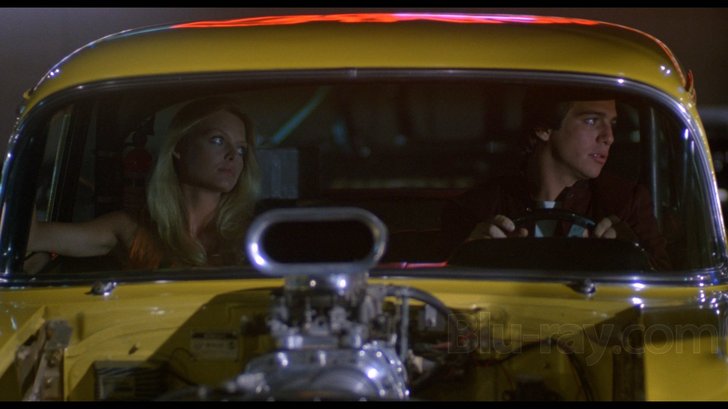
When Sony released The Hollywood Knights on DVD in 2000, it included three soundtracks: original mono, a stereo soundtrack and a 5.1. The Blu-ray includes only the 5.1 soundtrack, presented in DTS lossless. A listener would be pardoned, however, for thinking that the track was either mono or stereo, because it's entirely front-oriented. If any sound trickled into the rear speakers, it was so quiet that I missed it. There's no panning to left or right, and the bulk of the film's sound, including both dialogue and effects, remains anchored to the center channel, with some support from the main front speakers. The film has no score, but (again in a nod to American Graffiti) the soundtrack is filled with an impressive array of era-appropriate pop tunes, with an emphasis on Motown and the Four Seasons. The songs are heard as "source music" from car radios, the sound system at Tubby's, the sound booth at Dr. J's station, the performers at the high school auditorium, etc. This form of inclusion makes it easier to accommodate the songs naturally into the mix. The dialogue is always clear, and the track's dynamic range is more than acceptable, even if the bass extension is nothing special.
The Hollywood Knights Blu-ray Movie, Special Features and Extras 
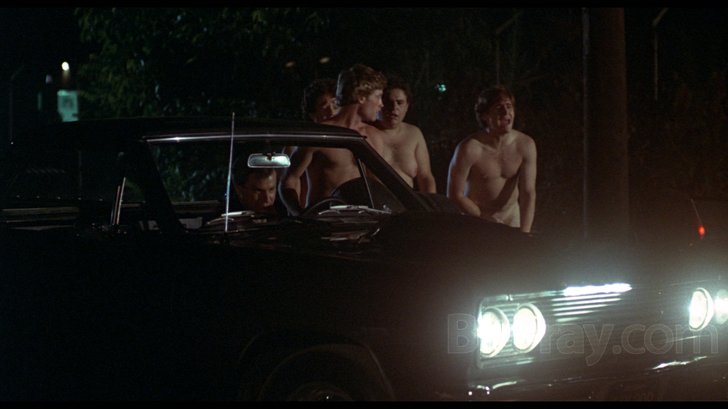
Sony released Hollywood Knights on DVD in 2000, and if you have that DVD, hold onto it, because it had a commentary track by writer-director Floyd Mutrux that is nowhere to be found here. On the plus side, the Blu-ray follows Image's usual practice, instead of Sony's, by including the film's trailer. The Sony DVD omitted the trailer (yes, Sony did that even then), opting instead to include so-called "bonus" trailers for two other films featuring Michelle Pfeiffer (The Deep End of the Ocean and The Age of Innocence). The DVD also had "production notes" in a printed insert.
- Theatrical Trailer (HD; 1.85:1; 2:10): This is the kind of trailer no one makes anymore, where the narration is clever enough to be worth something in its own right. It's a series of variations on all the things they can't show you in the trailer.
The Hollywood Knights Blu-ray Movie, Overall Score and Recommendation 
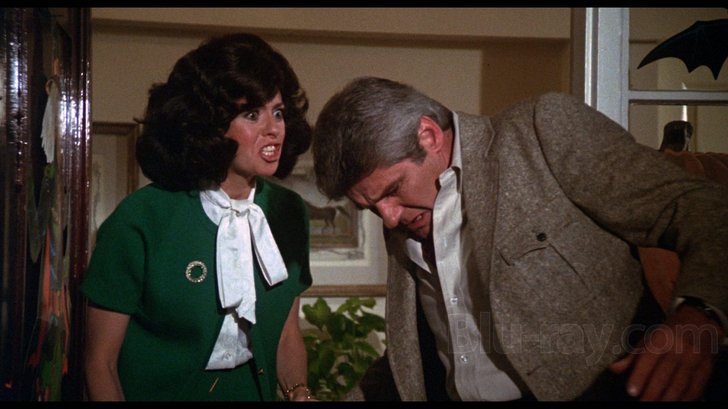
So why did Porky's do so much better than Hollywood Knights? I think writer-director Floyd Mutrux miscalculated by retaining the nostalgia factor of American Graffiti. Nostalgia is a bittersweet sensation, one that George Lucas extended into all aspects of his sophomore feature film. It doesn't pair smoothly with bare boobs, coarse behavior, and gross-out gags. Porky's didn't try to maintain any sort of nostalgia factor. No one in it was saying goodbye to anything except virginity. It also had the clever idea of making Porky the bar owner an enemy against whom everyone, both the young rebels and the adult forces of order, could ultimately present a united front. Knights doesn't have that kind of enemy. Officer Bimbeau may be an incompetent jerk and Mrs. Freedman a blue-nosed hypocrite, but would you want Newbomb Turk running riot in your neighborhood? Me neither. Still, if you enjoy goofy episodic comedies filled with juvenile jokes and raunchy humor (and who doesn't from time to time), The Hollywood Knights is worth a look. The Blu-ray is far from demo material, but it's an accurate representation of the film and is rated accordingly. Recommended for existing fans, with the caveat that you should hold onto your DVD for the commentary. New viewers should probably rent first.
Similar titles
Similar titles you might also like

The Kentucky Fried Movie
1977

Detroit Rock City
1999

The Long Dumb Road
2018

Just Another Girl on the I.R.T.
Paramount Presents #38
1992

Get Crazy
Flip Out
1983

Max Dugan Returns
1983

Brighton Beach Memoirs
1986

Tunnel Vision
Tunnelvision / MVD Rewind Collection
1976

The Groove Tube
1974

My Favorite Year
Warner Archive Collection
1982

MADtv
1995-2009

George Carlin: Life Is Worth Losing
2005

Frank McKlusky, C.I.
2002

Rosencrantz & Guildenstern Are Dead
1990

Blue in the Face
1995

Save Your Legs!
Limited Edition to 3000
2012

The Impostors
1998

Flirting with Disaster
1996

The Magic Christian
1969

The Butcher Boy
1997
